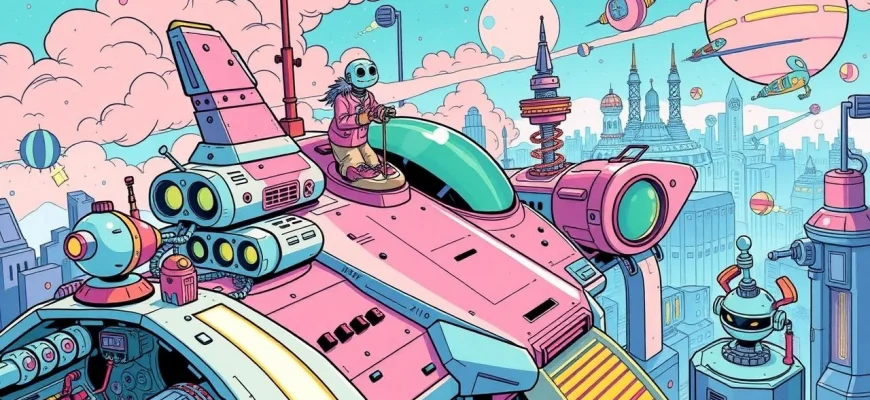If you're a fan of the witty humor, sci-fi adventures, and quirky characters of 'Futurama,' you're in for a treat! This article explores 10 movies and TV shows that capture the same spirit of futuristic fun, clever satire, and heartfelt storytelling. Whether you're craving more intergalactic escapades or just love animated comedies with a twist, these picks will keep you entertained.
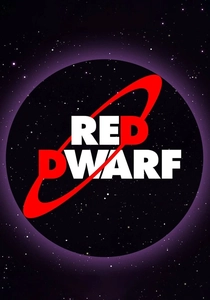
Red Dwarf (1988)
Description: This British sci-fi comedy shares Futurama's premise of a slacker protagonist (Lister and Fry) in space, accompanied by a sarcastic robot (Kryten and Bender). Both shows use their sci-fi settings to explore human nature and relationships through a comedic lens. The blend of character-driven humor with genuine sci-fi storytelling makes them kindred spirits. Red Dwarf's 'last human alive' concept mirrors Fry's 'last 20th century man' status.
Fact: The show holds the Guinness World Record for longest-running sci-fi comedy. It was originally going to be called 'Dave Hollins: Space Cadet.' The cat people evolved from Lister's pregnant cat, Frankenstein, left aboard the ship.
 Watch Now
Watch Now 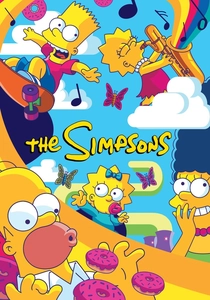
The Simpsons (1989)
Description: As the longest-running American animated series, The Simpsons shares Futurama's satirical take on society, family dynamics, and pop culture. Both shows were created by Matt Groening and feature his signature art style. The humor in both series ranges from slapstick to clever wordplay, often with a touch of heartwarming moments. The Simpsons' occasional sci-fi themed episodes (like those featuring Professor Frink) particularly echo Futurama's tone.
Fact: The Simpsons has predicted numerous real-world events, including the presidency of Donald Trump. 'D'oh!' was added to the Oxford English Dictionary in 200The show holds the record for most guest stars in a TV series, with over 600 celebrities voicing characters.
 Watch Now
Watch Now 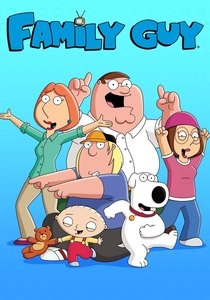
Family Guy (1999)
Description: Family Guy shares Futurama's irreverent humor, cutaway gags, and tendency to break the fourth wall. Both shows feature a lovable, dimwitted protagonist (Peter Griffin and Fry) surrounded by a colorful supporting cast. The sci-fi elements in Family Guy's 'Stewie & Brian' adventures parallel Futurama's space escapades. Both series also frequently employ musical numbers and celebrity guest voices.
Fact: Seth MacFarlane voices Peter, Stewie, Brian, and Quagmire among others. The show was canceled in 2002 but revived in 2005 due to strong DVD sales. Family Guy holds the record for most cutaway gags in a single episode (84 in 'Ocean's Three and a Half').
 Watch Now
Watch Now 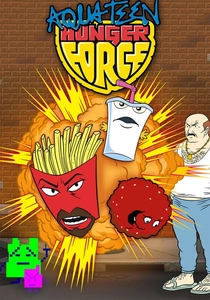
Aqua Teen Hunger Force (2000)
Description: This absurdist Adult Swim classic shares Futurama's surreal humor and sci-fi elements, though taken to even more bizarre extremes. Both shows feature unconventional found families (the Planet Express crew and the sentient fast food items) dealing with strange phenomena. The shows share a similar late-night appeal with cult followings. Aqua Teen's non-sequitur humor and disregard for continuity influenced many adult animated shows that followed.
Fact: The show's full title was originally 'Aqua Teen Hunger Force Colon Movie Film for Theaters.' The Mooninites caused a real-life bomb scare in Boston with a guerrilla marketing campaign. Despite the title, the 'Aqua Teens' rarely if ever fight hunger.
 Watch Now
Watch Now 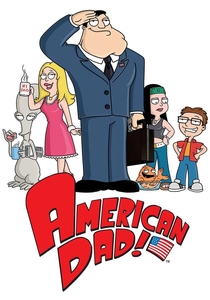
American Dad! (2005)
Description: American Dad! shares Futurama's formula of combining family dynamics with absurd scenarios, often involving science fiction elements (thanks to Roger the alien and Stan's CIA adventures). Both shows feature a talking non-human character (Roger and Bender) who provides much of the comic relief. The political satire in American Dad! is more overt than Futurama's, but both shows use humor to comment on social issues.
Fact: Roger's persona was originally going to be the family dog before becoming an alien. The show was created as a more politically focused counterpart to Family Guy. Klaus the German goldfish was originally a East German Olympic skier whose brain was transplanted into a fish.
 Watch Now
Watch Now 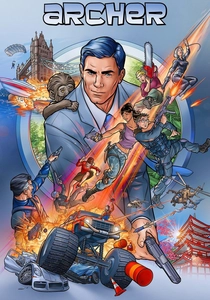
Archer (2009)
Description: Archer shares Futurama's sharp, rapid-fire dialogue and pop culture references. Both shows feature a dysfunctional yet endearing cast of characters working in unusual professional settings (a space delivery company and a spy agency). The animation styles, while distinct, both employ clean lines and expressive character designs. Archer's blend of action and comedy, often with sci-fi elements in later seasons, mirrors Futurama's approach.
Fact: The show was originally pitched as 'James Bond meets Arrested Development.' H. Jon Benjamin voices Archer despite not being able to do a convincing British accent. The animation style changed significantly in season 5 to a Miami Vice-inspired aesthetic for the 'Archer Vice' storyline.
 Watch Now
Watch Now 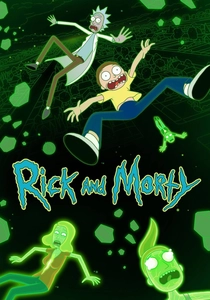
Rick and Morty (2013)
Description: Rick and Morty shares Futurama's blend of science fiction and comedy, often exploring absurd and complex sci-fi concepts with a humorous twist. Both shows feature eccentric, genius protagonists (Rick Sanchez and Professor Farnsworth) who drag their less intelligent companions (Morty and Fry) on wild adventures across the universe. The shows also tackle existential themes and parody popular culture, making them intellectually stimulating while remaining hilarious.
Fact: Co-created by Dan Harmon, the mind behind Community, and Justin Roiland, who voices both Rick and Morty. The show's infamous 'Szechuan Sauce' episode led to a real-life shortage of the McDonald's condiment. Each episode's post-credits scene often contains some of the show's most bizarre and memorable moments.
 Watch Now
Watch Now 
Space Dandy (2014)
Description: This anime series shares Futurama's love for space exploration tropes and genre parody. Both shows feature a crew of misfits (Dandy's team and the Planet Express crew) having episodic adventures with no lasting consequences. Space Dandy's vibrant visual style and musical sequences give it a similar energetic, fun-loving tone. The shows both balance philosophical sci-fi concepts with outright silliness.
Fact: Each episode was directed by a different renowned anime director. The English dub was recorded before the Japanese version, which is rare for anime. Creator Shinichiro Watanabe also made Cowboy Bebop and Samurai Champloo.
 Watch Now
Watch Now 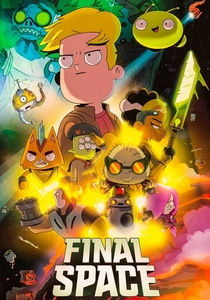
Final Space (2018)
Description: Final Space combines Futurama's space adventure premise with a more serialized, emotional narrative. Both shows feature a hapless human protagonist (Gary and Fry) paired with a tough, robotic companion (HUE and Bender). The balance between comedy and dramatic stakes is similar, though Final Space leans more heavily into dramatic storytelling. The visual style of alien worlds and technology will feel familiar to Futurama fans.
Fact: Creator Olan Rogers originally conceived the story as a web series. David Tennant voices the villainous Lord Commander. The show was canceled after three seasons but has a passionate fanbase campaigning for its return.
 Watch Now
Watch Now 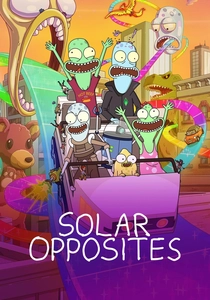
Solar Opposites (2020)
Description: Created by Justin Roiland (co-creator of Rick and Morty), Solar Opposites shares Futurama's premise of aliens trying to understand human culture while dealing with their own interpersonal dynamics. The show blends sci-fi concepts with suburban satire, much like Futurama's mix of space adventures and workplace comedy. Both shows feature a mismatched group of characters forced to coexist, with one particularly cynical robot (Bender and The Pupa).
Fact: The show was originally developed for Fox before moving to Hulu. The 'Wall' storyline became so popular it's getting its own spin-off. Justin Roiland voices both Korvo and the Pupa, using two distinct vocal styles.
 Watch Now
Watch Now 
